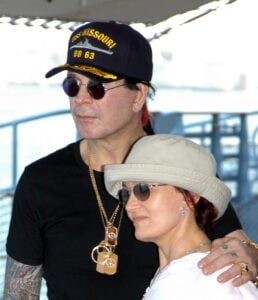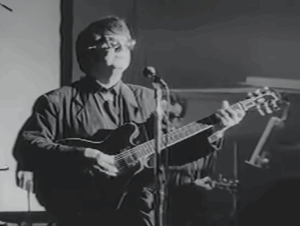10 Rock Songs We Don’t Care If Get Erased Or Canceled

Guitarist Jimmy Page performing with his band 'Led Zeppelin' at the Seattle Coliseum, June 1972. (Photo by Robert Knight Archive/Redferns/Getty Images)
Rock and roll isn’t without its missteps—songs that make you wonder, “What were they thinking?” Even the biggest bands have tracks they’d probably rather forget. While some songs show a spark of creativity, strange choices often turn them into cringe-worthy moments instead of hits.
It’s even worse when artists truly believe in these songs, only for them to fall flat. Though these tracks remain minor blemishes in legendary discographies, they’re proof that not every experiment works. If they vanished, most fans wouldn’t miss them.
‘Sell Me a Coat’ – David Bowie
As a master of reinvention, David Bowie moved fluidly between pop, soul, and glam rock. However, even legendary people have bad days, and Bowie’s first vaudeville try with “Sell Me a Coat” is evidence that not all attempts are successful. From his debut album, the song is stiff and uninspiring; it sounds more like a peculiar Englishman’s digression on winter clothing than anything revolutionary.
Without the flair that Bowie always brought to even the most basic subjects, the song plods around with little to say. Rather than demonstrating his talent for narrative or inventiveness, it seems clumsy and unprofessional, akin to a performer’s unsteady debut recital. Even though Bowie’s audacious inventiveness would later revolutionize music, “Sell Me a Coat” is still very different from the iconic rock and roll we’ve known him.
‘Summer of Love’ – The Beach Boys
Even legends like The Beach Boys have their low points, and by the mid-1970s, it was clear Brian Wilson was struggling. Though he managed to deliver a few decent tunes, tracks like “Hey Little Tomboy” hinted at a creative decline. Things only got worse when Wilson stepped back entirely, leaving Mike Love to steer the ship—and the band’s reputation—straight into murky waters with Summer in Paradise.
The album is packed with questionable choices, but “Summer of Love” stands out for all the wrong reasons. Love attempts a smooth R&B vibe that lands more like a cringe-worthy dad trying to impress at a wedding. The music video doesn’t help, with Wilson awkwardly sidelined while Love sings about the ocean, surrounded by bikini-clad women half his age.
Rock bands often have embarrassing moments, but this one takes the cake. If you’re in the mood for secondhand embarrassment, look no further.
‘Hot Dog’ – Led Zeppelin
When they venture beyond their comfort zone, even the best bands may make mistakes. With “Hot Dog” on In Through the Out Door, Led Zeppelin, who are renowned for changing the laws of rock with their thunderous riffs and bluesy swagger, made an unexpected—and awkward—detour. Although the band frequently honored their blues heritage, many fans were baffled by their attempt at rockabilly.
The song feels flat and uninspired despite Robert Plant’s passionate vocals. The song feels more like a gimmick than a genuine attempt since the music lacks the depth and impact that Zeppelin fans had grown accustomed to. While their desire to respect rockabilly’s origins is commendable, Zeppelin’s appeal was in pushing boundaries rather than going back to them.
For a band that lived on being the opposite of that polished, safe sound, “Hot Dog” feels more like a step backward than a tribute to Elvis Presley’s time. Zeppelin lost their edge in a rare instance.
‘My World’ – Guns N’ Roses
The 1990s saw Guns N’ Roses riding high, but their egos often seemed bigger than their music. While Slash kept his head down and tried to steady the ship, Axl Rose wasn’t satisfied unless every project was bigger and more over-the-top. By the time Use Your Illusion wrapped up, “My World” felt like the band’s final, baffling mic drop—a confusing foray into industrial music that left fans scratching their heads.
Listening to these albums in sequence, the second version of “Don’t Cry” already pushes the limits, but “My World” takes the absurdity to another level. Rose’s attempt to sound tough in this industrial-style experiment comes off more like a parody, with dialogue seemingly ripped from a cheesy action flick.
It’s a strange ending to an album full of elongated and overproduced tracks, leaving the listener wondering why everything fizzled out instead of soaring to a climactic finish. On the bright side, “My World” might give us a glimpse of what Chinese Democracy could’ve sounded like if it had dropped in the ’90s—a messy, head-scratching experiment that feels out of place in the Guns N’ Roses catalog.
‘Illegal Alien’ – Genesis
Although Genesis was never recognized for their comedic style, they did occasionally attempt to include humor into their songs. Regretfully, “Illegal Alien” is a perfect illustration of why they ought to have avoided the endeavor. In this song from their pop heyday, Phil Collins narrates the narrative of an illegal immigrant with a laughable Mexican accent—a tone-deaf and embarrassing idea by today’s standards.
Cultural insensitivity is also seen in songs like “Turning Japanese,” but “Illegal Alien” goes one step further with its extravagant music video. Instead of approaching the subject with any true delicacy or respect, Collins and the band dressed like stereotypes, intensifying the uneasy feelings.
For a band that ruled the charts in the 1980s, it’s a rare slip-up. Even during the height of Collins’ popularity in pop music, however, “Illegal Alien” sticks out for all the wrong reasons—it’s a strange moment that leaves you wondering how it was ever approved.
‘Money for Nothing (unedited version)’ – Dire Straits
Dire Straits might not seem like the kind of band to spark controversy. With their laid-back vibe and “cool dad” aesthetic, scandals were never their thing. But when they released Brothers in Arms, the unedited version of “Money for Nothing” came with some baggage that no one needed.
The song, a staple of MTV and a career highlight, features lyrics inspired by a department store worker mocking musicians on the rise. While Mark Knopfler’s storytelling captured the worker’s voice verbatim, it also included some homophobic slurs that feel cringeworthy today. Back then, people may have been less aware of the harm such language caused, but it doesn’t excuse those words from being included in the final cut.
Though the track remains a rock classic, the unedited version reflects a tone-deaf moment in music history. If anyone still insists on playing that version today, it says more about their mindset than about the song itself.
‘Girls of Summer’ – Aerosmith
Aerosmith had established themselves as one of the most reliable rock bands in the United States by the 2000s. Their distinctive blend of swing, power ballads, and catchy rock made them music industry titans, despite their beginnings as underdogs in the post-Rolling Stones era. But things changed as they stepped outside the rock.
The band experimented with more pop-centric sounds on “Just Push Play”, but “Girls of Summer” was too much. The song didn’t exactly work out, but it felt like a scientific experiment meant to create the ideal pop tune. The Timberlake-style production sounded out of place with Steven Tyler’s typical swagger, and the guitar riffs were far from Joe Perry’s best work.
Although Aerosmith’s songs frequently dance around sex, their attempt to reimagine Tyler as a pop world hottie came off as odd. It’s fantastic for bands to change, but perhaps they’ll be a little more tactful the next time.
‘How Many Say I’ – Van Halen
Eddie Van Halen was a musical genius, not only as one of the greatest guitarists ever but also for his skills on the keyboard and his ability to create unforgettable melodies. Both the David Lee Roth and Sammy Hagar eras of Van Halen thrived thanks to his talents, each bringing something special. However, giving Eddie the microphone on Van Halen III was a decision that didn’t quite work out.
The album as a whole is a bit of a mess, with Gary Cherone’s vocals and a few out-of-tune tracks, but “How Many Say I” stands out as an especially odd choice. It’s a ballad that feels like a strange dream, with Eddie attempting a Tom Waits-like gravelly voice, but it ends up sounding more like Roger Waters with a cold.
While many appreciate Van Halen III as an album Eddie really wanted to make, “How Many Say I” serves as a reminder that it was time for a change. It was a sign that getting the band back together for A Different Kind of Truth was the right move—ending on such a note would’ve been a sad way for Eddie to close out his career.
‘Christine Sixteen’ – Kiss
Some songs just don’t age well, especially when the lyrics wouldn’t fly today. While it’s tempting to laugh off outdated tunes and topics, there’s a point where political correctness can seem a bit overbearing. For example, if anyone genuinely connects with “Christine Sixteen”, they might need to check their own behavior.
Kiss may have played up their bad-boy image, but Gene Simmons’s lyrics about underage love are cringeworthy and gross. He might argue it’s part of his rebellious persona, but there’s nothing playful about singing about a girl being “young and clean”—it just comes off as uncomfortable.
Kiss has a history of pushing boundaries with their lyrics, but songs like this one are better left in the past. While they weren’t known for an extensive catalog of timeless hits, there’s no reason for them to keep pushing creepy themes. Let’s just say, “Christine Sixteen” feels like a song you can skip for everyone’s sake.
‘Wild Honey Pie’ – The Beatles
Music history is best left as it is—there will always be highs and lows in every era, but those rough patches make the great moments even more special. The Beatles definitely pushed boundaries with The White Album, but someone should’ve stepped in to prevent “Wild Honey Pie” from ever seeing the light of day.
While the song is a fun, quirky nod to Paul McCartney’s love for old-school tunes, Wild Honey Pie takes it too far. It feels more like an experimental misfire, with McCartney’s attempt at being avant-garde coming off as a cat in distress, rather than a fresh musical direction.
Though many would point to John Lennon’s “Revolution 9” as the album’s most confusing track, “Wild Honey Pie” is the real one that should’ve been left out. The White Album is already packed enough, and cutting this strange noise would’ve made for a better listening experience—without losing any of its magic.






















